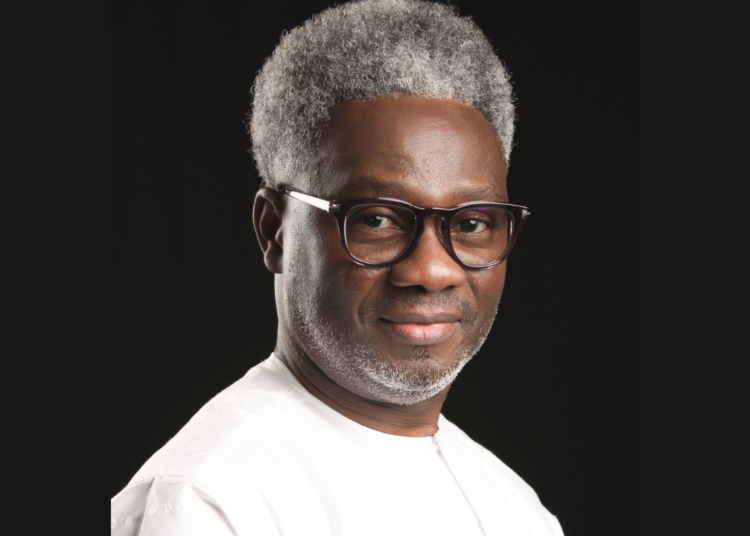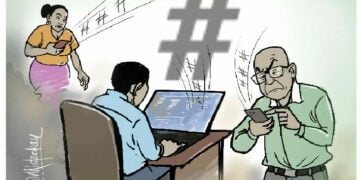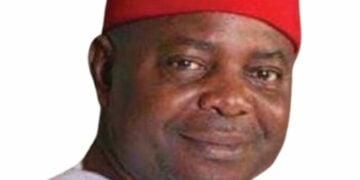Dr. Omoniyi Ibietan is the author of the popular book, ‘Cyber Politics – Social Media, Social Demography and Voting Behaviour in Nigeria.’
The main reason Ibietan wrote the book was to explore why voters behave the way they do, especially, during elections.
Ibietan posited that social media has some level of control over the decisions of Nigerians, during election period, even as he disclosed that social media (which he described as the fifth estate of the realm) has come to stay, but advised that it is the duty of the people to use the various social media platforms responsibly.
Referring to the 2015 general elections, the author revealed that survey showed that social media constituted less than 10 per cent in helping voters to decide who to vote for. He added that although, social media is critical, several studies revealed that the media operates in the context of certain mediating factors and influences. Several factors are what decide the voting pattern of electorates, he averred.
The Editor-In-Chief, LEADERSHIP Newspaper, Mr Azubuike Ishiekwene while reviewing the book, averred that, the 12 chapters of the 460 pages of the book examines Nigeria’s 2015 general elections, adding that, the author not only examines earlier studies on the impact of social factors, including peer, opinion leader and family influences on voter behaviour, he also sets out the broad objectives of the book, raising issues that are both specific and contemporaneous in value.
Cyber Politics, was of course, not the first to venture into the theme of the 2015 elections, voter behaviour and social media in Nigeria. In Chapters One and Four, for example, the author cites other studies which had touched on the subject, too.
“What commends Cyber Politics, however, as we see in Chapter Three, is its laser-beam focus on the role of three pre-selected social media platforms – Facebook, Twitter and WhatsApp – on voter behaviour especially in the election under reference.
“It explores, among other things, the question of whether political conversations amongst Nigeria’s estimated 33 million active social media users, especially the influencers as of 2021 had any significant impact on the outcome of the 2015 election
“Cyber Politics helps me as a voter to ponder if the social networks I belong to or the influencers I follow have any potential effects on my political behaviour either in terms of mobilisation or my actual voting decisions. Sometimes we think we’re our own man, until we realise like Pavlov’s dog, that someone somewhere might be pulling the strings,” Ishiekwene averred.
Ibietan has indeed received a lot of accolades as stakeholders including the executive vice chairman, Nigerian Telecommunications Commission (NCC), Prof Umar Danbatta, described the book as a very rich and resourceful book to communication scholars, while recommending that Nigerians should grab a copy.
Career and education
The author was a former student’s union leader, first, at the Kwara State College of Technology, Ilorin, and later, at the University of Abuja, where he was rusticated in the famous case of Niyi Ibietan & 45 others v. University of Abuja and two others.
The author, whose parents are from the old Kwara state, later re-enrolled at the University of Uyo. As a result of the disruption caused by his activism, it took him 10 years to obtain his First degree; but when he did, he did so in style. He finished top of his class.
Ibietan has an M.A, in Communications and Language Arts from the University of Ibadan, UI.
He proceeded to the Institute for Public-Private Partnerships and WEDC, Loughborough University for professional certification as a regulation specialist.
Ibietan is also a Doctorate Fellow, in Communication from North-West University, South Africa.
Ibietan was appointed as the head of media relations management at the Nigerian Communications Commission(NCC).
Before his new role, he had previously served as the agency’s head of online media for about ten months.
He was also the senior manager, Media Management, and earlier, he served the Commission as senior manager Legislative Relations. In that capacity, he was a frontline relationship manager of the Commission with the National Assembly (Nigeria’s Federal Bicameral Parliament).
Before he joined the NCC in 2007, Ibietan signed on with the Nigerian Communications Satellite Limited, set up its Corporate Communications Department, and later managed its Media Strategy and External Relations responsibilities.





